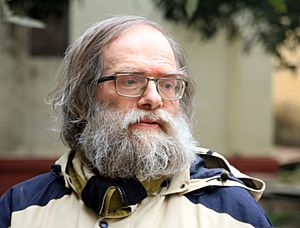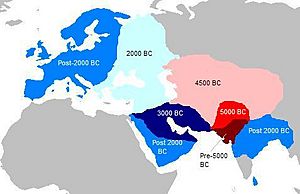Koenraad Elst facts for kids
Quick facts for kids
Koenraad Elst
|
|
|---|---|

Elst in Varanasi, Uttar Pradesh in 2018.
|
|
| Born | 7 August 1959 Leuven, Belgium
|
| Nationality | Belgian |
| Education | Katholieke Universitiet Leuven Benaras Hindu University |
| Occupation | Author |
Koenraad Elst (born 7 August 1959) is an author from Belgium. He is known for his support of the Hindutva idea, which is a movement promoting Hindu culture and values. He also supports the "Out of India" theory. This theory suggests that the ancient Indo-European languages started in India and spread from there. Most scholars, however, do not agree with this theory.
Contents
Early Life and Education
Koenraad Elst grew up in a Flemish Catholic family.
He studied Indology (the study of India), Sinology (the study of China), and philosophy at the Catholic University of Leuven in Belgium. While he was a student, he was involved in the Flemish movement, which supports Flemish culture and identity.
From 1988 to 1992, Elst studied at the Banaras Hindu University in India. In 1999, he earned his PhD in Asian Studies from Leuven. His PhD work was about Hindu revivalism, which is a movement to bring back and strengthen Hindu traditions. His doctoral paper was later published as a book called Decolonizing the Hindu Mind.
His Writings and Ideas
Ideas About Ancient Aryans
In his books, Update on the Aryan Invasion Debate (1999) and Asterisk in Bhāropīyasthān (2007), Elst discusses the origins of Indo-European languages. Most experts believe these languages began in Central Asia and spread to the Indian subcontinent through migrations around 2000 BCE. This is known as the Kurgan hypothesis.
However, Elst suggests a different idea. He proposes that these languages actually started in India. He believes that ancient people called Aryans, who were native to India, then moved out to the Middle East and Europe, spreading their language. Elst thinks that language information can be understood in different ways. He argues that the main language theories could also fit with his "Out of India" idea.
Elst is one of the main supporters of the Indigenous Aryans theory, also known as the "Out of India" theory. Most scholars do not accept this theory. They see it as a fringe idea, meaning it is not widely supported by the academic community.
Views on Hindutva and Other Religions
Elst was an editor for a Flemish nationalist journal from 1992 to 1995. This journal focused on discussing criticism of Islam. He also wrote for The Brussels Journal, a conservative blog.
In his book Ram Janmabhoomi vs Babri Masjid, Elst wrote about the birthplace of Rama, a Hindu god/king. He argued that this site was where the Babri Masjid mosque stood. He also described Islam as a very strict faith in this book. This book was published by Voice of India, a publisher that supports Hindu nationalist ideas and has published many books that are critical of Muslims.
Elst has written in support of Hindutva, which is a Hindu nationalist movement. This movement is often linked with conservative political groups in India, like the Bharatiya Janata Party. Elst sees Hindutva as a way to help Indians reconnect with their past Hindu culture and traditions.
He has also written that ancient Vedic science was very advanced. In his book The Saffron Swastika, he argues against the idea that the Hindutva movement is similar to fascism.
Elst has also discussed the idea of "Indian-ization" for Muslims and Christians in India. He believes they should accept the importance of Hindu culture. In his 1992 book, Negationism in India: Concealing the Record of Islam, Elst claimed that it is difficult to criticize Islam in India. He also accused some historians of ignoring crimes committed by Muslims against Hindu communities.
Influences
Some of Koenraad Elst's writings have been used by others. For example, Anders Behring Breivik, a Norwegian terrorist, used parts of Elst's work in his own writings. Breivik's writings called for all Muslims to be removed from Europe. He quoted Elst to support his claim that there was a big effort to "deny the large-scale and long-term crimes against humanity committed by Islam."
See also
 In Spanish: Koenraad Elst para niños
In Spanish: Koenraad Elst para niños
 | James B. Knighten |
 | Azellia White |
 | Willa Brown |


